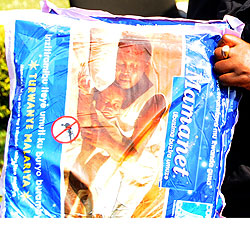Rwanda has differed with the recent findings by Danish researchers that mosquitoes carrying the malaria parasite have virtually disappeared in several parts of sub-Saharan Africa. Researchers said that rainfall patterns in the recent years were more chaotic and often fell outside the rainy season, disturbing the natural cycle of mosquito development and subsequent disappearance.


Rwanda has differed with the recent findings by Danish researchers that mosquitoes carrying the malaria parasite have virtually disappeared in several parts of sub-Saharan Africa.
Researchers said that rainfall patterns in the recent years were more chaotic and often fell outside the rainy season, disturbing the natural cycle of mosquito development and subsequent disappearance.
According to the Director General of the Malaria unit in TRAC Plus, Dr. Corine Karema, the population of the mosquitoes in Rwanda was reduced due to the different programs including massive distribution of treated mosquito nets.
"These interventions are known to have a significant effect in vector population. We can say that findings in that paper may not directly apply in Rwanda,” she said.
The Danish researchers conducted their study in a Tanzanian village and concluded that the results apply to five countries; Rwanda, Tanzania, Eritrea, Kenya and Zambia.
"The findings of a study in a town in Tanzania cannot be generalised in Africa neither in Rwanda or other countries cited in the publication. One fact is that in Rwanda, there have been many interventions implemented at country level which can have an impact on vector population due to mosquito mortality and reduced longevity,” said Dr. Karema
She added that mosquito studies conducted in Rwanda have not yet recorded high numbers nor behavior change of the parasites.
"We still get many mosquitoes in areas that have recently introduced rice cultivation and are marshy,” she said.
One of the suspected causes of mosquito extinction is a possible disease among the vector population, but according to Karema, there’s no evidence about that.
Ends


